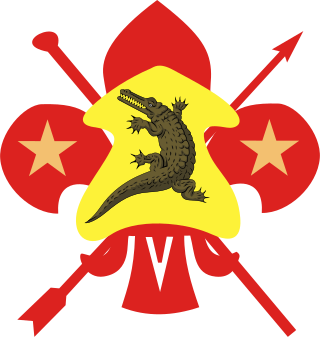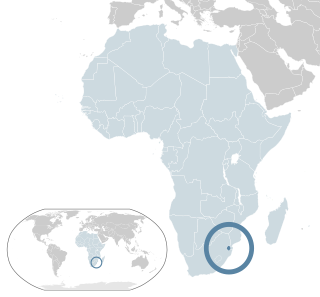
Eswatini, officially the Kingdom of Eswatini and also known by its former official name Swaziland, is a landlocked country in Southern Africa. It is bordered by Mozambique to its northeast and South Africa to its north, west, south, and southeast. At no more than 200 km (120 mi) north to south and 130 km (81 mi) east to west, Eswatini is one of the smallest countries in Africa; despite this, its climate and topography are diverse, ranging from a cool and mountainous highveld to a hot and dry lowveld.
The Umbutfo Eswatini Defence Force (UEDF) is the military of the Southern African Kingdom of Eswatini (Swaziland). It is used primarily during domestic protests, with some border and customs duties; the force has never been involved in a foreign conflict. The army has struggled with high rates of HIV infection. Since measures were put in place the rate is dropping.

The World Organization of the Scout Movement is the largest international Scouting organization. WOSM has 174 members. These members are recognized national Scout organizations, which collectively have around 43 million participants. WOSM was established in 1922, and has its operational headquarters at Kuala Lumpur, Malaysia and its legal seat in Geneva, Switzerland. It is the counterpart of the World Association of Girl Guides and Girl Scouts (WAGGGS).

Mswati III is Ngwenyama (King) of Eswatini and head of the Swazi royal family.

The People's United Democratic Movement is the largest opposition party in Eswatini. It is a democratic socialist party. Formed in 1983 at the University of Eswatini, it is led by Mlungisi Makhanya.

The Scout Promise is a spoken statement made by a child joining the Scout movement. Since the publication of Scouting for Boys in 1908, all Scouts and Girl Guides around the world have taken a Scout promise or oath to live up to ideals of the movement, and subscribed to a Scout Law. The wording of the Scout Promise and Scout Law have varied slightly over time and from country to country. Although most Scouting and Guiding organizations use the word "promise", a few such as the Boy Scouts of America tend to use "oath" instead.
The Boy Scouts of America (BSA), one of the largest private youth organizations in the United States, has policies which prohibit those who are not willing to subscribe to the BSA's Declaration of Religious Principle, which has been interpreted by some as banning atheists, and, until January 2014, prohibited all "known or avowed homosexuals", from membership in its Scouting program. The ban on adults who are "open or avowed homosexuals" from leadership positions was lifted in July 2015.

The Association of Scouts of Azerbaijan the national Scouting organization of Azerbaijan, was founded in 1997, and became the 150th member of the World Organization of the Scout Movement on 20 August 2000. In 2017 it was admitted as a full member in the World Association of Girl Guides and Girl Scouts. The coeducational association has 1,571 members as of 2021, about 35% are girls.

The coeducational Organization of the Scout Movement of Kazakhstan was officially founded in 1992, and received World Organization of the Scout Movement recognition on January 16, 2008. In 2011, it had 1,223 members.

Slovenský skauting, is the primary national Scouting and Guiding organization of Slovakia. Currently has around 7000 members. With 3,157 Scouts and about 3,000 Guides. Slovenský Skauting is the largest youth organization in Slovakia and a member of both the World Organization of the Scout Movement and the World Association of Girl Guides and Girl Scouts.

The Scouts of Namibia is the national Scouting organization of Namibia. It serves 2,845 Scouts.

Lesotho Scout Association is the national Scouting association of Lesotho. Founded in 1936, it became a member of the World Organization of the Scout Movement in 1971. Lesotho Scout Association serves 2,630 Boy Scouts as of 2021.

The Seychelles Scout Association (SSA) is the national Scouting organization of the Seychelles. Scouting in Seychelles was founded in 1927 and became a member of the World Organization of the Scout Movement (WOSM) in 2002. The association has 372 members.

Religion in Scouting and Guiding is an aspect of the Scout method that has been practiced differently and given different interpretations in different parts of the world over the years.

The Eswatini Girl Guides Association is the national Guiding organization of Eswatini (Swaziland). It serves 3,450 members. It was founded in 1924 as a girls-only organization. World Chief Guide Olave Baden Powell visited in 1950 it became a Branch Association of The Guide Association in the UK. It became a self-governing body in 1969 when it became an associate member of the World Association of Girl Guides and Girl Scouts in 1969.
The Scout and Guide movement in Eswatini (Swaziland) is served by

Lesbian, gay, bisexual, and transgender (LGBT) people in Eswatini have limited legal rights. According to Rock of Hope, a Swati LGBT advocacy group, "there is no legislation recognising LGBTIs or protecting the right to a non-heterosexual orientation and gender identity and as a result [LGBT people] cannot be open about their orientation or gender identity for fear of rejection and discrimination". Homosexuality is illegal in Eswatini, though this law is in practice unenforced. According to the 2021 Human Rights Practices Report from the US Department of State, "there has never been an arrest or prosecution for consensual same-sex conduct."
Education in Eswatini includes pre-school, primary, secondary and high schools, for general education and training (GET), and universities and colleges at tertiary level.
HIV/AIDS in Eswatini was first reported in 1986 but has since reached epidemic proportions. As of 2016, Eswatini had the highest prevalence of HIV among adults aged 15 to 49 in the world (27.2%).
The Health in Eswatini is poor and four years into the United Nations sustainable development goals, Eswatini seems unlikely to achieve goal on health. As a result of 63% poverty prevalence, 27% HIV prevalence, and poor health systems, maternal mortality rate is a high 389/100,000 live births, and under 5 mortality rate is 70.4/1000 live births resulting in a life expectancy that remains amongst the lowest in the world. Despite significant international aid, the government fails to adequately fund the health sector. Nurses are now and again engaged in demonstrations over poor working conditions, drug stock outs, all of which impairs quality health delivery. Despite tuberculosis and AIDS being major causes of death, diabetes and other non-communicable diseases are on the rise. Primary health care is relatively free in Eswatini save for its poor quality to meet the needs of the people. Road traffic accidents have increased over the years and they form a significant share of deaths in the country.















